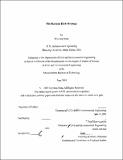The Korean hub strategy
Author(s)
Song, Kiyoung, 1978-
DownloadFull printable version (15.05Mb)
Alternative title
Strategic analysis of Korean hub strategy
Other Contributors
Massachusetts Institute of Technology. Dept. of Civil and Environmental Engineering.
Advisor
Fred Moavenzadeh.
Terms of use
Metadata
Show full item recordAbstract
This thesis introduces the Korean hub strategy and evaluates its viability. For benchmarking analysis, two best practices - the Netherlands and Singapore, are compared with Korea. Competition issues are also studied with two potential contenders - Hong Kong and China, in the Northeast Asian hub race. To mount the level of advanced countries and to cope with the explosive economic growth of China, the Korean government sets up an ambitious plan; being the most successful business hub in Northeast Asia. Its strategic scheme is divided into two categories - logistics hub and business center. For years, the Netherlands and Singapore have dominated as the regional hub with the unique role. The Netherlands focuses on the logistics in the Europe with solid regional economic cooperative system and strategic flexibility, while Singapore has had much attention to be the leading regional business hub in the Southeast Asia with strong government driven policy and the attractive national character - openness. With favorable regional economic environment and the China growth factors, in the Northeast Asian hub competition, Korea tries to grasp competitive advantage with relatively superior geographical location, technological advance and resourceful manpower. However, Hong Kong and China also have spurred their efforts to take advantage in the hub competition. With a pro-foreign environment and sound infrastructure, Hong Kong has already gained a leading position in the race. Meanwhile, China has an immense domestic demand and blazing speed of growth as strong merits to compete. To get a chance of success in the competition, Korea should overcome some critical barriers such as much entangled economic environment that might disturb regional economic cooperation, the weak level of competitive advantages in the various range of attributes that Korea possess, and currently risky political status in Korean peninsula that is caused by nuclear brinkmanship of North Korea. Unfortunately, considering overall competencies, Korea cannot offer any obvious credibility about their comprehensive capability to deal with those obstacles effectively and win the competition in the current frame of analysis. Therefore, the outlook of the Korean hub strategy is unclear and the viability of that also seems to be doubtful.
Description
Thesis (S.M.)--Massachusetts Institute of Technology, Dept. of Civil and Environmental Engineering, 2003. Includes bibliographical references (leaves 103-107).
Date issued
2003Department
Massachusetts Institute of Technology. Department of Civil and Environmental EngineeringPublisher
Massachusetts Institute of Technology
Keywords
Civil and Environmental Engineering.